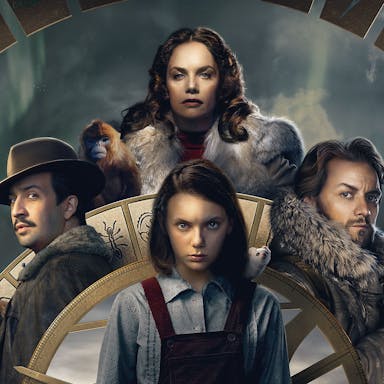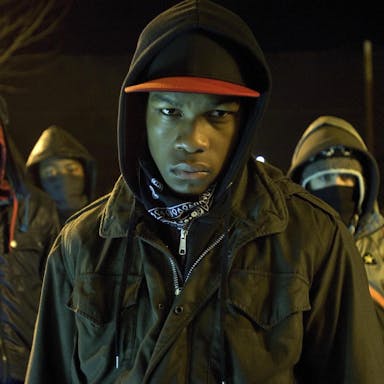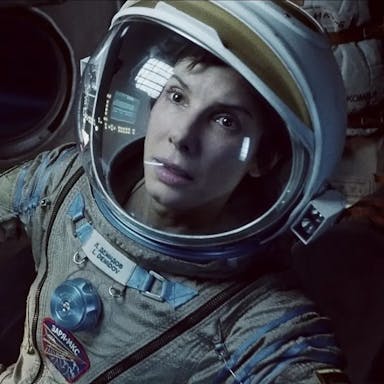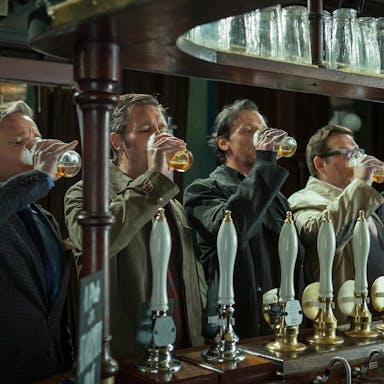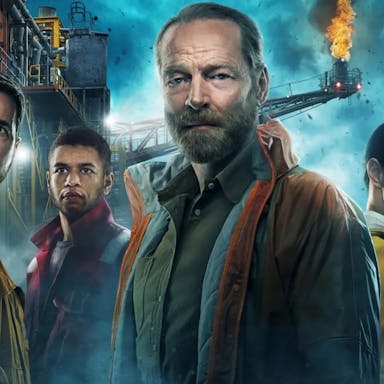Every fantasy and science fiction fan occasionally has a moment where we wonder whether those Game of Thrones dragons would be able to fly, or how many marmalade sandwiches a bear like Paddington would need to survive. Recently, ScreenUK has teamed up with Den of Geek, Roddenberry Entertainment and the podcast Does It Fly? to seriously – but also hilariously – examine some of the biggest science fiction hits ever to come out of the UK. Will they hold up in their science as well as they do in terms of their entertainment?
First up the podcast’s hosts, astrophysicist Hakeem Oluseyi and pop culture expert Tamara Krinsky look at whether the TARDIS (Time And Relative Dimension In Space) could fly in Doctor Who. You’re probably familiar with the long-running hit show: over 60 years now the Doctor – a time-travelling alien with two hearts who can regenerate into new bodies when mortally wounded – has been entertaining audiences. Since the 2005 reboot, when it was resurrected by showrunner Russell T. Davies (It’s A Sin, Queer as Folk) it has won worldwide acclaim. Most recently, of course, Ncuti Gatwa (Sex Education) has become the Fifteenth Doctor in one of its most popular seasons yet. But can a small box that’s bigger on the inside really fly through space and time? The answer that Hakeem comes up with will surprise you!
If that’s left you jonesing for more wibbly-wobbly, timey-wimey stuff – to quote David Tennant’s (Good Omens) Tenth Doctor – why not try the romantic comedy time travel of About Time? You could tussle with dinosaurs in Primeval or relive the ‘70s in Life on Mars. There’s hopping between realities in His Dark Materials too, as our child heroine jumps between dimensions to save the world from her own parents, played by James McAvoy (Trance) and Ruth Wilson (The Little Stranger). Or, if it’s the Doctor’s own reality that intrigues you, there are spin-off shows Torchwood or The Sarah Jane Adventures on offer, catering to a more grown-up and younger audience respectively.

Doctor Who

About Time
Next the podcast looks to Alfonso Cuaron’s Children of Men, the stunning 2006 sci-fi film starring Clive Owen (Elizabeth: The Golden Age) and Julianne Moore (Mary & George). Based (loosely) on the novel by legendary writer P.D. James (Death Comes to Pemberley), this dystopian tale imagines a world where no human child has been born in 18 years. So could such a mass epidemic of infertility affect a species? It’s nightmarish, but perhaps not impossible. And if you enjoy these what-if possibilities, Black Mirror is the TV show for you as each episode explores a different possible scenario based on our current technologies. If it’s the apocalyptic vision you prefer, try a new TV adaptation of H.G. Wells’ The War of The Worlds or, for the kids, a fun disaster movie like Robot Overlords. Any self-respecting Alfonso Cuaron fan will also want to watch Gravity again, about an astronaut struggling to survive without her ship in zero G.
Hakeem and Tamara also considered whether the pitch-black aliens of Attack the Block, with their spiky exteriors and glowing blue teeth, make sense. Director Joe Cornish (Lockwood & Co) set an alien invasion movie in a rundown south London block of flats and set a gang of young teens – including future star John Boyega (Small Axe, Star Wars) and Jodie Whitaker (Doctor Who again, Good Vibrations) – to defend the planet. Get ready for some fascinating chat about how pheromones work and the best way to decelerate an interstellar space ship in this one. And, once you’re finished listening, why not try a few other alien invasion stories? The World’s End sees an alien takeover derail a pub crawl organised by old friends in a cast led by Simon Pegg (Spaced), Paddy Considine (How to Build a Girl, Journeyman) and Martin Freeman (Sherlock), all from the twisted genius of Edgar Wright (Hot Fuzz, Shaun of The Dead). Gareth Edward’s debut feature Monsters features a very different kind of aliens, after a crashed NASA probe gives rise to giant alien life-forms across the deserts of the American Southwest. Or there’s the most subtle invasion of all, Under the Skin. This oblique and critically acclaimed sci-fi from Jonathan Glazer (The Zone of Interest) sees Scarlett Johansson (The Other Boleyn Girl) play an alien who preys on human men.

Children of Men

Attack the Block
If that leaves you in the mood for creepy sci-fi horror, good! The sci-fi classic Alien is next on the examining table, as the podcast hosts discuss whether an acid-blooded parasite can grow inside a human body. If you haven’t seen that unforgettable film from Ridley Scott, who would go on to make epics like Napoleon, Gladiator and The Martian, you’re missing out. You could also try a film influenced by but very distinct from that hit: Sunshine, from director Danny Boyle (28 Days Later), about an international gang of astronauts trying to restart Earth’s sun. There’s a similarly claustrophobic atmosphere in recent TV hit The Rig too, wherein very strange things begin to happen for the crew of an oil rig. And of course there is 2001: A Space Odyssey, arguably the greatest science-fiction movie ever made and definitely the most influential, and another set (mostly) aboard a single space ship.
Finally, the team looked at Red Dwarf, the space comedy about the survivors of an interstellar disaster: an underachiever, a hologram, a robot and a mutated cat. A key element of the show is the idea that Lister (Craig Charles, Coronation Street) is the last surviving human, after spending 3 million years in a stasis booth. So could a stasis booth keep someone alive for that long? It’s a familiar idea in sci-fi (see also: the Alien films) but one that throws up a lot of questions. Then there’s the question of whether artificial lifeforms can truly be alive – something also explored in Alex Garland’s film Ex Machina and the TV series Humans. If you’re mostly there for the laughs, however, turn to The Hitchhiker’s Guide to The Galaxy, the sci-fi comedy whose madcap humour was a major influence on Red Dwarf and really every sci-fi comedy made since.

Alien

Red Dwarf
For all this and more, including a look at Black Mirror’s San Junipero afterlife technology and 3 Body Problem’s VR headset, check out Does It Fly? on all good podcast providers. And for more great British science fiction games, animation, TV and film, have a browse around ScreenUK. There’s no end of space, time and space-time to explore.

